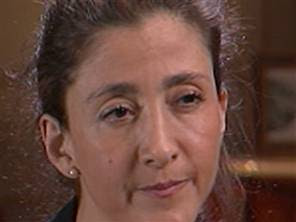Ingrid Betancourt

Buddha Diaries writes about recently released French Columbian politician Ingrid Betancourt and her Buddhist wisdom. She seems incredibly serene inspite of her torture and captivity for 6 years in a Columbian jungle camp.
... there is no room for hate." So says Ingrid Betancourt, out of the wisdom of her six years of captivity in Columbian jungle camps by the Revolutionary Armed Forces of Columbia. "You have to pardon," she continues. I think that's the key of everything. We're human beings. We think different, we act different, but we are human beings."
I watched the few moments of her interview with NBC's Ann Curry that their morning show could spare, and was glad indeed to encounter her humanity. She spoke of the necessity for compassion not out of some philosophical belief, but out of a heart and body exposed to worst a human being might have to experience; extending it not only to those she loves, but to her captors, imprisoners, and torturers. There's true wisdom for you, compassion in its most generous and non-judgmental form. Let's call her "enlightened." To watch Betancourt and listen to her speak is to see and hear Buddhism in practice, with none of its religious trappings but all of its human understanding. Perhaps she, seemingly a devout Catholic, would call it simply Christian. If so, it's Christianity as Christ surely intended it.
"Vengeance is a chain." Listening to these words, I could not help but think about our hapless situation in Iraq, and how the piously "Christian" man in the White House and those he chose to appoint as his advisers exploited our instinctive (read "primitive") need for vengeance after the 9/11 attacks in order to promote his aggressive resource war for oil; and how we are now "chained" to the Middle East in ways that might have been avoided, had he chosen instead the path of wisdom and compassion. Clearly we needed, at that moment, to do what was necessary to protect ourselves from further attack: I personally think that a forceful response to Al Qaeda and its Taliban supporters in Afghanistan was necessary, if regrettable--not as an act of vengeance, but rather as a practical strategy for self-defense.
The invasion of Iraq was a different matter entirely. It could not have been achieved, I think, without the provocation of 9/11. I don't believe the American people would have tolerated the aggression without the exploitation of their emotional reaction to the 9/11 attacks. As a nation, we were still hot with shock and righteous anger, and still grieving those thousands of us who had died. In our rage, we were persuaded to overlook the well-established truth, that violence breeds only violence, and that vengeance never fails to wreak as great a devastation on its perpetrator as upon its victim. Compassion was the last thing on our minds as we surveyed the wreckage of the World Trade Center, deprived of even the bodies of the dead to bury.
Had we done more to address the root causes--among them, the genuine feeling in the Muslim world that the West was out to exploit their resources at the cost of their cultural and religious heritage--we might find ourselves in a very different situation today. Had we been just a little more Buddhist--or more Christian--in our response, we might now have more friends than enemies in that part of the world. Had we really paid attention and fully realized the role of oil in all this global instability, we might have begun to address our own addiction and be headed, already, toward a diminished dependency and a less threatened planet.
Instead, we chose vengeance. And what a powerful chain it has proved to be. We have yet to learn the lesson of Ingrid Betancourt. "We're human beings. We think different, we act different, but we are [all] human beings

Comments